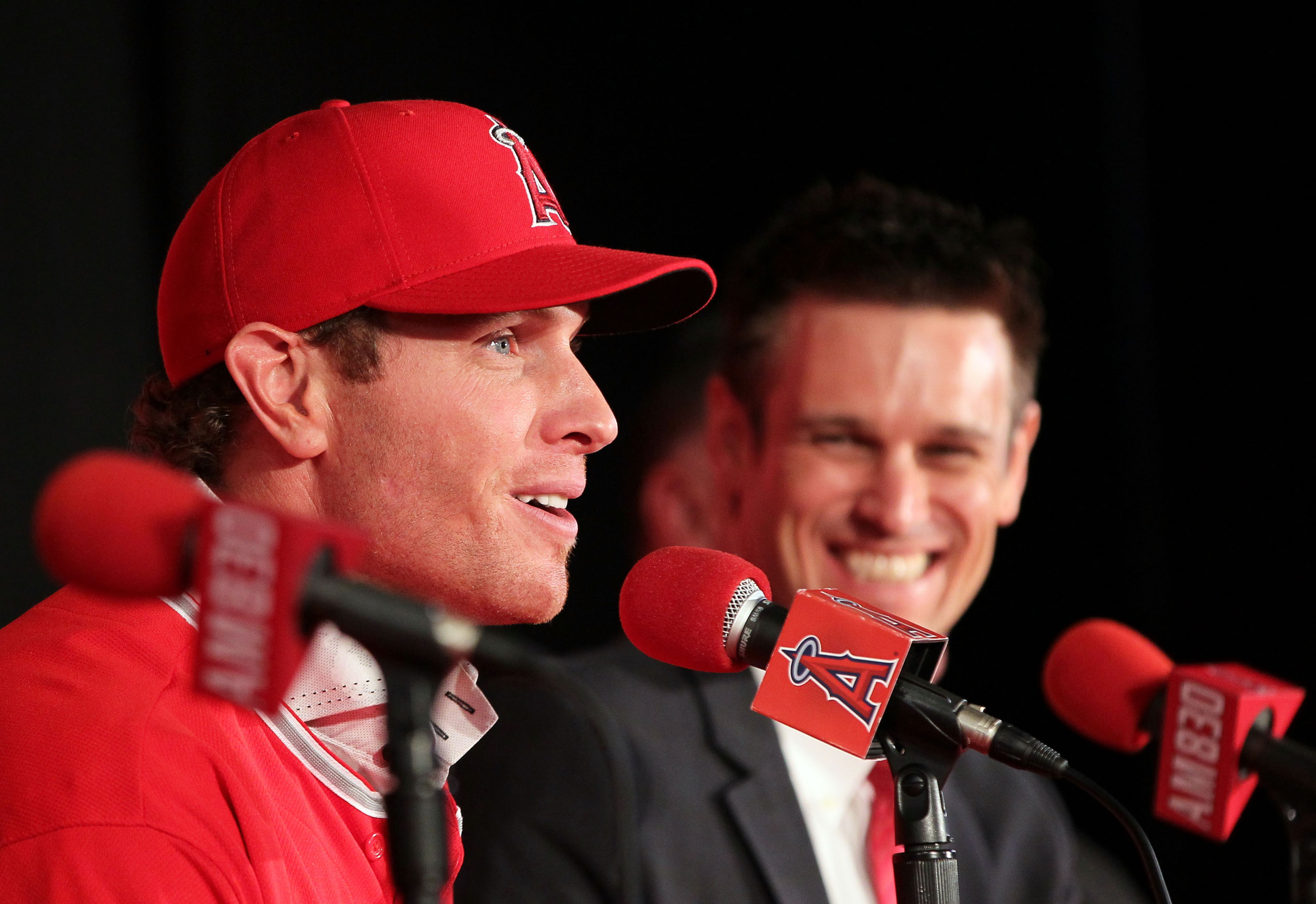
Some things to read while planning ahead.
The Brewers came up just short in their efforts for their third straight road win, as Andrelton Simmons' double in the ninth gave the Braves a 3-2 walkoff victory. Eric has the recap, if you missed it.
The Brewers lost last night despite another solid outing from Tyler Thornburg, who allowed two runs on seven hits over seven innings and recorded a career-high eight strikeouts (h/t @joe_block). Thornburg's season is likely over with a 2.03 ERA, and a 1.47 mark in seven starts.
Jeff Bianchi needed the whole year to do it but finally hit his first home run of 2013 last night. It was a sufficiently remarkable event to appear in You Can't Predict Baseball's daily roundup.
Other notes from the field:
- This was the Braves' 24th final at-bat win of 2013, as compared to 12 for the Brewers. (h/t @AdamMcCalvy)
- Despite losing last night, the Brewers clinched fourth place in the NL Central when the Cubs also lost. (h/t @Haudricourt)
The series wraps up tonight at 6:10 when Kyle Lohse takes on Paul Maholm. Kevin Massoth has the MLB.com preview.
Meanwhile, the Brewers have made an expected change to this weekend's scheduled starters for the Mets series. Wily Peralta is continuing to deal with blister issues so the team has opted to shut him down and will give Jimmy Nelson his first major league start on Saturday.
Marco Estrada is still expected to start the season's final game on Sunday, giving him one last chance to put an exclamation point on a great second half. Nicholas Zettel of Disciples of Uecker has a look at his strong outing from Monday.
The news is not as good for Jean Segura or Tom Gorzelanny. Segura experienced more discomfort while trying to run on Tuesday and the team is now saying he won't play again until he's back at 100%. Meanwhile, Gorzelanny's 2013 comeback attempt is over as he's still experiencing issues with his shoulder.
While the performance of several young players has given us something to look forward to, not everyone is excited about the 2014 Brewers. SI.com's 2013 post-mortem on the Brewers says they "don't seem likely to be a contender" a year from now.
Of course, a lot can happen between now and Opening Day. Norichika Aoki's name is consistently coming up as a player that could be moved this winter, and Benjamin Orr of Reviewing the Brew has a look at the possibility.
In the minors:
- John Sickels of Minor League Ball has a recap of the first professional seasons of players selected in the supplemental portion of the 2013 second round. He says Tucker Neuhaus "looks more like a long-term project than a quick riser."
- If we discuss Neuhaus, it follows that we'll also mention fellow 2013 top pick Devin Williams. MLB Prospect Guide listed him as the #2 pitcher in the Arizona League this season.
- Both Neuhaus and Williams have a chance to pitch in Appleton next season. Rattler Radio has a list of the top five home crowds at Wisconsin games this year.
Closer to home, fallout continues after the Ryan Braun suspension. His image has been removed from the cover of a new "Jewish Sports Stars" book.
If you'd like more Brewer coverage today but you're sick of reading, my Tuesday appearance on The Home Stretch with Justin Hull on 95.3 FM WSCO in Appleton has been archived. This week we talked a lot about attendance, context for attendance discussions and more.
No transaction notes today, so today we'll fill the gap with some classic They Might Be Giants:
Let's go around the NL Central:
- Michael Wacha came an out away from history in the Cardinals' 2-0 win over the Nationals, losing a no-hitter on an infield single with two outs in the final inning. Matt Carpenter doubled and scored a run and continues to lead the NL in hits, runs and doubles.
- The Pirates kept pace with an 8-2 win over the Cubs. Pedro Alvarez went 2-for-5 with a pair of doubles and drove in three runs.
- The Reds fell off the pace a bit with a 4-2 loss to the Mets. All four New York runs scored in the second inning, including three on Daniel Murphy's 13th home run.
- The Brewers, you likely know, lost to the Braves.
You can read more about those games and all of yesterday's action in Noah's Wednesday edition of Around the Bases at SBNation.com.
Here are today's updated standings and probables:
| Team | W | L | GB | Today | Time | Matchup |
| Cardinals | 93 | 65 | -- | v WAS | 12:45 pm | Shelby Miller v Jordan Zimmermann |
| Pirates | 91 | 67 | 2 | @ CHC | 1:20p | Francisco Liriano v Jake Arrieta |
| Reds | 90 | 68 | 3 | v NYM | 11:35a | Mat Latos v Daisuke Matsuzaka |
| Brewers | 70 | 87 | 22.5 | @ ATL | 6:10p | Kyle Lohse v Paul Maholm |
| Cubs | 65 | 93 | 28 | v PIT | 1:20p |
Today in former Brewers:
- Dante Bichette served as the Rockies hitting coach in 2013 but will not return in that role next season.
- Chris Mehring of Rattler Radio has a brief note on each of George Scott's AL-leading 36 home runs in 1975.
- Rattler Radio also has baseball cards for Ken Sanders and four other former Brewers from their time as Mets.
Last night's game was only a single out away from extra innings, which would have added to a record-breaking season. 239 games have gone to extra innings already in 2013, setting a new MLB record.
If I had to guess, I'd say this is why the Brewers do "all fan" giveaways instead of limited numbers: SBNation.com has a story on the chaos that ensued when Mariano Rivera Bobblehead Night at Yankee Stadium hit a series of snags.
Today In Brewer History was off this morning, but Plunk Everyone notes that today is 1998-2000 and 2009 Brewer David Weathers' 44th birthday and his 57 career plunkings lead all pitchers born on September 25. Today is also 2011 Brewer Wil Nieves' 36th birthday, and his four career HBP lead all active players born on this day.
Now, if you'll excuse me, I'm making progress.
Drink up.




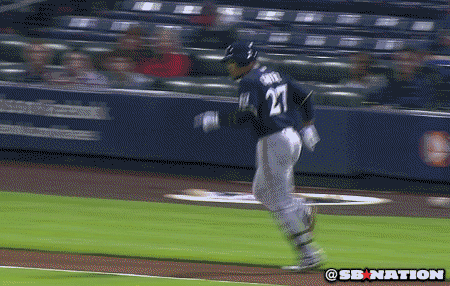
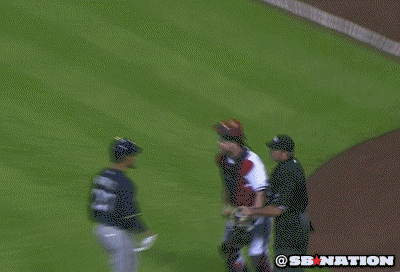









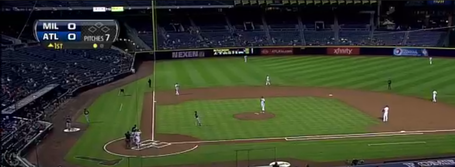
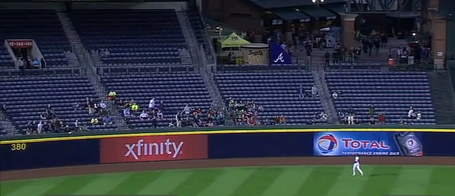

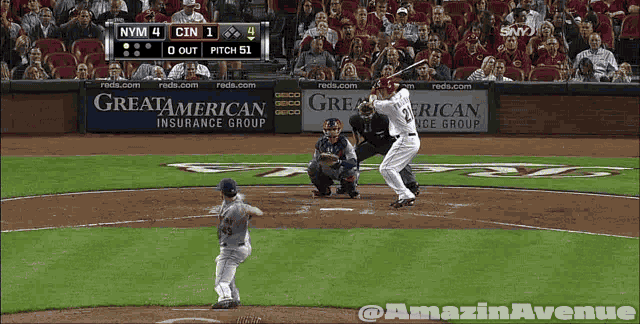
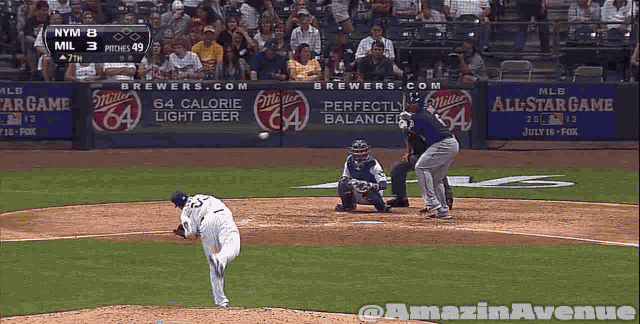
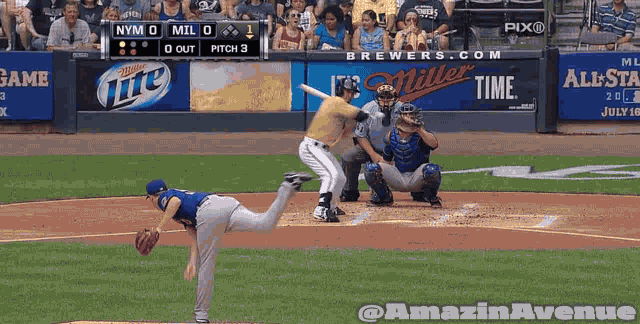

 Photo credit: USA TODAY Sports
Photo credit: USA TODAY Sports Photo credit: Doug Pensinger
Photo credit: Doug Pensinger
